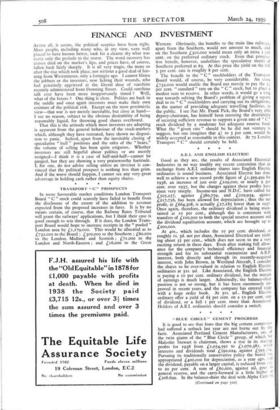A.E.I. AND ENGLISH ELECTRIC
Good as they are, the results of Associated Electrical Industries in no way modify my recent contention that an exchange from A.E.I. ordinary shares into English Electric ordinaries is sound business. Associated Electric has done well to achieve a new record profit figure of £1,399,499 for 1938, an increase of just over £109,000, OT nearly 9 per cent. over 1937, but the charges against these profits have risen very steeply. Income-tax and N.D.C. have called for £505,257, against £380,759, and £229,934, against £217,756, has been allowed for depreciation ; thus the net profit, at £664,308, is actually £27,185 lower than in 1937. Once again, therefore, the ordinary dividend is being main- tained at 10 per cent., although this is consistent with transfers of LI 00,00o to both the special reserve account and the dividend equalisation account, which are brought up to £200,000.
At 405., which includes the to per cent. dividend, or roughly is. 5d. net per share, Associated Electrical are yield- ing about 5i per cent., which does not seem to me a very exciting return in these days. Even after making full allow- ance for the company's technical efficiency and financial strength and for its substantial rearmament and A.R.P. interest, both directly and through its recently-acquired interest, with John Brown, in Westland Aircraft, I consider the shares to be over-valued in relation to English Electric ordinaries at 31s. 9d. Like Associated, the English Electric is paying a io per cent. ordinary dividend, but the margin of earnings is much larger. Admittedly, the balance-sheet position is not so strong, but it has been enormously im- proved in recent years, and the company has entered 1939 with a huge order book. At 31s. 9d., English Electric ordinary offer a yield of 61 per cent. on a io per cent. rate of dividend, or a full I per cent. more than Associated. Holders of A.E.I. ordinaries should consider a switch.














































 Previous page
Previous page